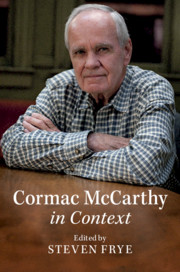Book contents
- Cormac McCarthy in Context
- Cormac McCarthy in Context
- Copyright page
- Contents
- Contributors
- Acknowledgments
- Chronology
- Part I Environments
- Chapter 1 Life and Career
- Chapter 2 The South
- Chapter 3 The Southwest
- Chapter 4 The Santa Fe Institute
- Part II Literary Contexts: Sources, Influences, Allusions
- Part III Intellectual Contexts
- Part IV Social and Cultural Contexts
- Part V Archives, Critical History, Translation
- Works Cited
- Index
Chapter 4 - The Santa Fe Institute
from Part I - Environments
Published online by Cambridge University Press: 12 December 2019
- Cormac McCarthy in Context
- Cormac McCarthy in Context
- Copyright page
- Contents
- Contributors
- Acknowledgments
- Chronology
- Part I Environments
- Chapter 1 Life and Career
- Chapter 2 The South
- Chapter 3 The Southwest
- Chapter 4 The Santa Fe Institute
- Part II Literary Contexts: Sources, Influences, Allusions
- Part III Intellectual Contexts
- Part IV Social and Cultural Contexts
- Part V Archives, Critical History, Translation
- Works Cited
- Index
Summary
This chapter deals with McCarthy’s relationship to the Santa Fe Institute, a scientific think tank at which he has been a fellow for many years. This institute, founded by Nobel Laureate Murray Gell-Mann, is known for cutting-edge research into a variety of scientific disciplines and for cross-disciplinary interaction that leads to new possibilities in scientific discovery. McCarthy has long been interested in science, and the Santa Fe Institute’s exploration of complex systems and chaos theory have informed much of his later work, specifically No Country for Old Men and The Road. Central to this chapter is McCarthy’s engagement with the idea of “emergence,” which suggests that out of the totality of individually simple interactions between constituents of a complex system there emerge higher order phenomena which are not reducible to the original components. This provocative idea finds its way into McCarthy’s thought and work.
- Type
- Chapter
- Information
- Cormac McCarthy in Context , pp. 33 - 44Publisher: Cambridge University PressPrint publication year: 2020

